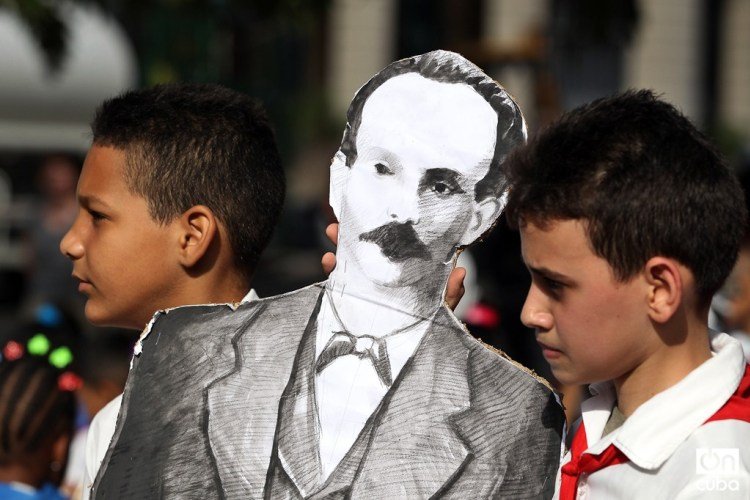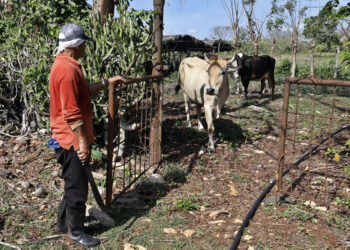Marti’s life and death are a mystery to Cubans. A man of the second half of the 19th century rules our lives with his thunderous tenderness, and in the 21st century he dares to teach us how to educate our children or how to be faithful to the homeland.
The distance between him and us is greater than a century and a half. His exemplarity is impossible in an era in which sacrifice is not withstood for more than two hours. We are not in a time to write by hand, to compose letters, to have known the shackles in our own flesh, to travel in ships across the Atlantic Ocean, to receive scented gift pads, to fight on horseback, and to give our lives for the independence of our country.
Martí guides us to a world unknown to him, his values of altruism and dignity are not fashionable, his life devoted to duty clashes head-on against a world focused on the full enjoyment of the senses.
But Martí loved beauty and his poetry is a deep imprint of love for Cuba and people, as well as proof of his devotion to all humanity. The sweet beauty of the 19th century, however, does not serve to encourage the rapid aspirations of today’s youth.
José Martí must be translated, as Julio Antonio Mella, another incomparable short life, tried to do. He must be adapted to the needs of the times, so that the new pines approach him as a possibility and not as an unrepeatable relic.
Marti’s example of dignity is universal. A cultured and respected man who decides to risk his life, an essential life for the freedom of Cuba, for the simple fact that it was not fair or honest or decent, to ask that Cubans go to battle, from the secrecy of a party of war.
The virtue that overcomes utility has appeared sporadically in the moments that have become crucial in Cuba’s history: Hatuey before his executioners, Carlos Manuel in San Lorenzo, Maceo in Baraguá, Martí in Dos Ríos, Abel and his companions before their torturers, Lidia and Clodomira martyred….
But an insane wind that has called for comfort, betrayal, opportunism, cowardice and indignity has always blown against that light. It has been here and not in another land where it has been asked that medical students be killed over nothing in 1871, where Martí has been finished off, where thousands of black men and women have been slaughtered in 1912, where the young men of Humboldt 7 were betrayed; and all the torturers of the dungeons of Machado and Batista were Cuban.
We are not a better people than any other. The nationalist howls dressed in hate when necessary, so the opportunists and ambitious can be well placed, scare the soul.
That is why those who take advantage of the fissures to sow our land with insurmountable craters are so despicable. Cuba must be, to save itself, a land of peace and forgiveness, of bridges and not walls, of love and not of hate, of reconciliation and justice.
It is a crime against the country to use Martí to justify distrust in the people, censorship, repression of different ideas, and distrust in political pluralism. Martí was a Democrat who believed in a just society, with equality, with equity, in a Republic without segregation and with a robust democracy.
It is also unworthy and sad to stain Martí, abandon him after putting him on guard in every corner of Cuba, in every park, in every square. Martí is exhausted from so much vigil, and now he must pay for our mistakes and for the hatred of those who do not know or feel like him.
The apostle did not die in 1953, he did not die a little with each young man killed that year. Martí does not die when we are good, brave and believe in justice and the usefulness of love without further ado.
Martí dies, the apostle’s blood is shed every time someone forgets that the people of Cuba must live happily, dignified and joyful, that they deserve peace and development, that democracy is also possible on this earth, that the Republic is a debt to his memory.
There are Martí busts more deeply offended than those that were bloodied. There are Martí busts that are put in places to follow an indication, to fill a form without content. In order for Martí to be more than a symbol, for him to be a reference, we have to found a society where solidarity, humility, honesty and beauty are worthwhile.
Martí is not Gonzalo de Castañón, nor are those who soiled his bust innocent students, but it is appropriate to remember that hatred is not a game, nor are fiery environments good for harmony and peace. I have never seen the press refer, with photos and signs, with articles, morning school meetings and alarm, to rapists, embezzlers, thieves, drug traffickers, murderers, and all these are more serious crimes than damaging a bust of a national hero.
Democracy is not a crowd asking for justice, the weight of the law is only what the law indicates before the crime or offense occurred. Martí must be protected by us, in soul and stone, with our humanism and with our prudence, with firmness, dignity and love for Cuba and all Cubans.










